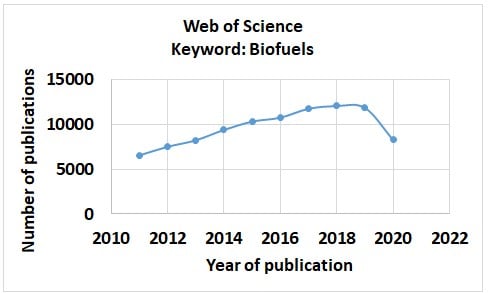Biomass as a Renewable Power Source
A special issue of Sustainability (ISSN 2071-1050). This special issue belongs to the section "Energy Sustainability".
Deadline for manuscript submissions: closed (1 February 2022) | Viewed by 7813
Special Issue Editor
Interests: carbon materials; biomass conversion; biofuels; electrochemistry
Special Issues, Collections and Topics in MDPI journals
Special Issue Information
Dear Colleagues,
Biofuels and biochemicals are a renewable and clean power resource. With the problems of depletion of fossil resources as well as the adverse effects of the indiscriminate use of fossil resources, there has been currently a paradigm shift to biofuels production. However, much of the research on this topic is far from the practical realization of industrial scale production at the biorefinery facility. The objective of the special issue on "Biomass as a Renewable Power Source" is to accelerate the research and development so that know-how is provided for the upcoming biorefinery installations. Such facilities have potential for alleviating the problems of energy shortages, catastrophic effects of climate change, growing joblessness among skilled youth, and economic inflation. Biomass is an abundant organic renewable feedstock that could be converted to biofuels such as biodiesel, bioethanol, glucose, biohydrogen, biomethane, biokerosene, jet fuel range hydrocarbons, bioelectricity and many other advanced biofuels by innovative catalytic processes, namely, transesterification, hydrolysis, dehydration, isomerization, alkylation, hydrogenation, oxidation and many others. A web of Science search with the keyword "biofuels" provides a total of 113,378 results (as on 2nd March 2021) in total. Growing interest in this field of research is clear from increase in number of publications on this topic during the last decade as shown in Figure 1.

Figure 1. A plot of number of publication Vs year of publication from the web of science with the search keyword “Biofuels”.
Owing to the potential of biomass to solve the diverse problems mankind is currently facing, it is intended to bring out this Special Issue on “Biomass as a Renewable Power Source”, which will serve as a resource material for academics for initiating semester courses in academic institutes to educate young students and researchers on this subject and also serve as guidance for policymakers as well as industrial investors for building the necessary infrastructure for biorefinery facilities to produce biomass-based power sources. The research community in this field is strongly encouraged to submit their research results for publication in this Special Issue of the journal Sustainability.
Scope:
- Biomass conversion processes;
- The transesterification of micro- and macroalgal biomass to biodiesel;
- The conversion of lignocellulosic and algal biomass to bioethanol;
- The conversion of biomass to biochemicals;
- Direct bioethanol alkaline fuel cells;
- The fermentation of carbohydrates to biofuels and biochemicals;
- The photofermentation of glucose to biohydrogen.
Dr. Indra Neel Pulidindi
Guest Editor
Manuscript Submission Information
Manuscripts should be submitted online at www.mdpi.com by registering and logging in to this website. Once you are registered, click here to go to the submission form. Manuscripts can be submitted until the deadline. All submissions that pass pre-check are peer-reviewed. Accepted papers will be published continuously in the journal (as soon as accepted) and will be listed together on the special issue website. Research articles, review articles as well as short communications are invited. For planned papers, a title and short abstract (about 100 words) can be sent to the Editorial Office for announcement on this website.
Submitted manuscripts should not have been published previously, nor be under consideration for publication elsewhere (except conference proceedings papers). All manuscripts are thoroughly refereed through a single-blind peer-review process. A guide for authors and other relevant information for submission of manuscripts is available on the Instructions for Authors page. Sustainability is an international peer-reviewed open access semimonthly journal published by MDPI.
Please visit the Instructions for Authors page before submitting a manuscript. The Article Processing Charge (APC) for publication in this open access journal is 2400 CHF (Swiss Francs). Submitted papers should be well formatted and use good English. Authors may use MDPI's English editing service prior to publication or during author revisions.
Keywords
- biomass
- biofuels
- biochemicals
- biodiesel
- bioethanol
- glucose
- levulinic acid
- formic acid
- biomethane
- biohydrogen
- biofuel cells
- solar energy
- CO2 conversion





